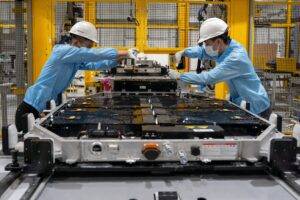
The EU has announced €4bn (£3.4bn) of state aid investments in new factories producing electric batteries for cars, heat pumps and solar panels as it seeks to accelerate production and the uptake of green technologies and combat cheap Chinese imports.
The Swedish battery producer Northvolt will receive €902m in state aid to build a new factory in Heide in Germany, while a wide range of clean tech factories in France are to get a €2.5bn bump in state aid.
The investments form part of the EU’s mission to be climate neutral with net zero gas emissions by 2050 but are also designed to help insulate the bloc from the growing competition from Chinese car, solar panel and other green tech factories.
It follows the approval of similar schemes in Austria, Belgium, Germany, Hungary, Italy, Slovakia, and Spain, worth in total €9.1bn, and with several others in the pipeline.
“The production of net zero equipment in Europe is of strategic interest for the European economy and society. It has immense importance for achieving our goals in clean mobility, sustainability, and competitiveness,” said Margrethe Vestager, who is back in her role as executive vice-president of the commission in charge of competition policy after an unsuccessful bid to head the European Investment Bank.
The EU said the money going to Northvolt’s gigafactory would enable it to “produce battery cells in Europe instead of the US”.
It is the first state aid approved under a special scheme aimed to stop production facilities being lured overseas with the promise of greater foreign subsidies.
Already Europe is feeling the strain of the head start China has had on producing lower cost electric cars.
Last month the European leaders agreed to a three-year suspension of a 10% tariff that was due to come in on EU electric cars exported to the UK and British electric cars exported to the EU amid fears the increased cost to the consumer would give a further advantage to Chinese competitors.
The Chinese conglomerate Build Your Dream (BYD), which launched lower-cost electric cars in the EU last summer, recently became the world’s number one producer of hybrid and battery-only vehicles.
In November it was reported that BYD was planning to build its first European car factory in Hungary.
The Chinese power battery company Eve Energy also started construction of its gigafactory in Hungary last year, while another player, Sunwoda, said it would also invest there.
Vestager said the investment in Germany was “an important step for the electrification of transport in Europe while preserving the level playing field in the single market”.
The near €3bn in state aid earmarked for France will support the production of batteries, solar panels, wind turbines and heat pumps, along with key component and critical raw material supply chains, the EU said.
Last year the European Commission president, Ursula von der Leyen, announced an investigation into potential Chinese state subsidies into the automotive industry, bringing with it the threat of a trade war.
But during a visit to Beijing at the end of the year she tried to persuade Chinese officials that the European market would not remain open if it was found to compete unfairly with local enterprise.
Read more:
EU announces €4bn aid deal to back battery and green tech factories




